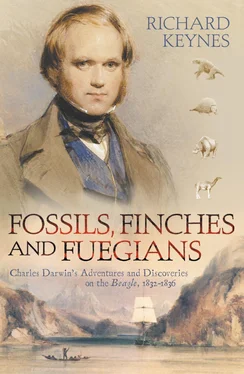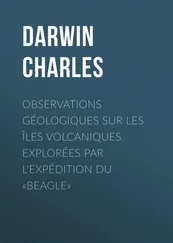1 ...7 8 9 11 12 13 ...22 1 Disreputable to my character as a Clergyman hereafter
2 A wild scheme
3 That they must have offered to many others before me, the place of Naturalist
4 And from its not being accepted there must be some serious objection to the vessel or expedition
5 That I should never settle down to a steady life hereafter
6 That my accomodations [sic] would be most uncomfortable
7 That you should consider it as again changing my profession
8 That it would be a useless undertaking 46
Enclosed with this letter was one from Josiah to Robert:
My dear Doctor I feel the responsibility of your application to me on the offer that has been made to Charles as being weighty, but as you have desired Charles to consult me I cannot refuse to give the result of such consideration as I have been able to give it. Charles has put down what he conceives to be your principal objections & I think the best course I can take will be to state what occurs to me upon each of them.
1— I should not think that it would be in any degree disreputable to his character as a clergyman. I should on the contrary think the offer honorable to him, and the pursuit of Natural History, though certainly not professional, is very suitable to a clergyman. 2— I hardly know how to meet this objection, but he would have definite objects upon which to apply himself, and might acquire and strengthen habits of application, and I should think would be as likely to do so in any way in which he is likely to pass the next two years at home. 3— The notion did not occur to me in reading the letters & on reading them again with that object in my mind I see no ground for it. 4— I cannot conceive that the Admiralty would send out a bad vessel on such a service. As to objections to the expedition, they will differ in each mans case & nothing would, I think, be inferred in Charles’s case if it were known that others had objected. 5— You are a much better judge of Charles’s character than I can be. If, on comparing this mode of spending the next two years, with the way in which he will probably spend them if he does not accept this offer, you think him more likely to be rendered unsteady & unable to settle, it is undoubtedly a weighty objection. Is it not the case that sailors are prone to settle in domestic and quiet habits. 6— I can form no opinion on this further than that, if appointed by the Admiralty, he will have a claim to be as well accommodated as the vessel will allow. 7— If I saw Charles now absorbed in professional studies I should probably think it would not be advisable to interrupt them, but this is not, and I think will not be, the case with him. His present pursuit of knowledge is in the same track as he would have to follow in the expedition. 8— The undertaking would be useless as regards his profession, but looking upon him as a man of enlarged curiousity, it affords him such an opportunity of seeing men and things as happens to few.
You will bear in mind that I have very little time for consideration & that you and Charles are the persons who must decide. I am / My dear Doctor / Affectionately yours / Josiah Wedgwood 47
Uncle Jos had thus with calm sense disposed effectively of Robert’s rather exaggerated qualms, and his description of Charles as ‘a man of enlarged curiousity’ was truly prophetic.
The two letters were dispatched to Shrewsbury early on 1 September, leaving Josiah and Charles to take out their guns for what would normally have been a specially enjoyable occasion for them, the opening day of the partridge season. They both had much on their minds, and Charles had only brought down a single bird when at ten o’clock Josiah did what ‘few uncles would have done’, bundled him into a carriage, and whisked him off to Shrewsbury to do battle in person with Robert. But there they found to their relief that Robert had already changed his mind, and was now ready to give ‘all the assistance in my power’.
On this same day Beaufort had conveyed the news to Robert FitzRoy that ‘I believe my friend M rPeacock of Trin yCollege Camb ehas succeeded in getting a “Savant” for you – A M rDarwin grandson of the well known philosopher and poet – full of zeal and enterprize and having contemplated a voyage on his own account to S. America.’ And that afternoon Charles himself sat down at Shrewsbury and wrote for the first time directly to Beaufort, explaining that the situation had changed since he had sent his refusal to Henslow and Peacock, and that if the appointment was still unfilled ‘I shall be very happy to have the honor of accepting it’.
On Saturday, 2 September, Charles returned to Cambridge, and spent Sunday closeted with Henslow, ‘thinking what is to be done’. Henslow explained how he himself had nearly accepted the appointment, but turned it down because of his wife’s unhappiness at the prospect, while Leonard Jenyns had done the same because he could not desert his parish at Swaffham Bulbeck. At Henslow’s, Charles met Alexander Charles Wood, a cousin and good friend of FitzRoy, and currently an undergraduate at Trinity College, Cambridge, and pupil of Peacock. At Peacock’s urging, Wood had written to recommend Charles to FitzRoy, which he had dutifully done, taking the precaution of warning his Tory cousin that Charles was politically a Whig and decidedly liberal in outlook. FitzRoy had just replied in a letter which Charles felt was ‘most straightforward & gentlemanlike , but so much against my going, that I immediately gave up the scheme’. However, Henslow firmly urged him not to make up his mind until he had had serious consultations with Beaufort and FitzRoy, so on Monday morning he took the coach to London, and had his first encounter with his sometimes erratic ‘beau ideal of a captain’.
The two young men, FitzRoy being then only twenty-six years old, and Charles four years younger, at once put themselves out to be agreeable. Charles wrote to his sister Susan, ‘Cap. Fitzroy is in town & I have seen him; it is no use attempting to praise him as much as I feel inclined to do, for you would not believe me.’ FitzRoy proposed that they would mess together, with no wine and the plainest dinners, fully sharing such limited working space as was available in so small a vessel. The trip would inevitably be stormy and uncomfortable, though if Charles found it too much for him he would always be at liberty to withdraw, and during the worst weather he might spend two months ashore in some healthy, safe and nice country. Such openness quickly restored all Charles’s enthusiasm for the voyage, leaving only a slight doubt – soon laid to rest by Beaufort – as to whether the Beagle would indeed sail back across the Pacific and thus circumnavigate the world. Charles wrote later that:
On becoming very intimate with FitzRoy I heard that I had run a very narrow risk of being rejected, on account of the shape of my nose! He was an ardent disciple of Lavater, * and was convinced that he could judge a man’s character by the outline of his features; and he doubted whether anyone with my nose could possess sufficient energy and determination for the voyage. But I think he was afterwards well-satisfied that my nose had spoken falsely.
To his sister Charles concluded, ‘There is indeed a tide in the affairs of men, & I have experienced it, & I had entirely given it up until 1 to day.’
There ensued some frenzied activity in London, while Charles followed up introductions given him by Henslow to experts for advice of all kinds, from naturalists knowledgeable on what to collect and how best to preserve the specimens, to suppliers of instruments, glassware, paper, books and guns. His sisters looked after his wardrobe, buying him strong new pairs of shoes and shirts marked with his name for the ship’s laundry. His friend John Coldstream advised him to use an oyster-trawl of the ordinary size for collecting marine animals, to provide himself with a few lobster pots, and when at anchor to ‘shoot’ some deep-sea fishing lines baited with small pieces of worm-eaten wood and hooks. He met Captain P.P. King, FitzRoy’s senior officer on the previous expedition, and, unasked, King said that FitzRoy’s temper was perfect, and that he was sending his own son Philip Gidley King on the Beagle as a midshipman. Charles lashed out and bought an expensive portable dissecting microscope made by Bancks, of the type recommended to him by the eminent botanist and microscopist Robert Brown. With the help of the bookseller and ornithologist William Yarrell he ordered a rifle and a brace of pistols for £50, flattering himself with the thought that FitzRoy would have spent £400. They might be needed, he told a friend, ‘for we shall have plenty of fighting those d— Cannibals’. On 8 September, when all the shops were closed, he found an excellent seat from which to watch the procession at the coronation of King William IV, who ‘looked very well, & seemed popular: but there was very little enthusiasm, so little that I can hardly think there will be a coronation this time 50 years’. In other spare moments he worked at astronomy, ‘as I suppose it would astound a sailor if one did not know how to find Lat & Long’.
Читать дальше












